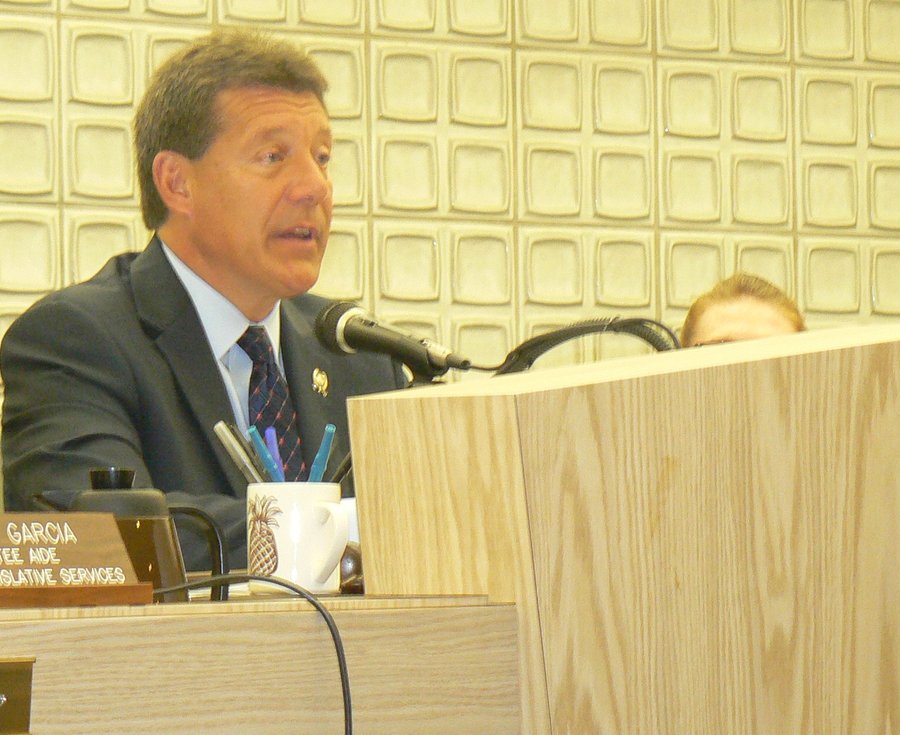As the time for public comment drew to a close last week, the public and environmental groups’ opposition to the state’s proposed $225 million settlement with ExxonMobil over the company’s contamination of sites in Bayonne and Linden stayed strong.
That was evident as the Assembly Judiciary Committee public hearing was held in Bayonne, and the state committee took testimony from several groups that back clean water and land, and a handful of Bayonne residents.
The state filed suit against the oil giant several years ago, seeking $8.9 billion. The court case dragged on until early this year, when it was revealed by news outlets that the Christie administration was seeking to forge a settlement with ExxonMobil. Critics of the agreement have said that the pact works out to be pennies on the dollar for what the government was seeking.
“I am concerned with how this settlement will have a long-term effect on the city.” – Mayor James Davis
____________
The lawsuit stems from charges that ExxonMobil and its predecessors at the Bayonne site had polluted the site at the city’s eastern end for more than 120 years. Damage to the Exxon Bayway site in Linden was said to have gone on for decades as well.
Bayonne Mayor James Davis said he was contacted by legislative officials about having the event at the Bayonne City Council chambers and he said he was glad to oblige.
“I was ecstatic they reached out to have it here, because Bayonne is one of the cities affected,” Davis said. “This gave me the chance to speak out for the city of Bayonne.”
At the session’s beginning, the mayor acknowledged that the oil refining industry had had a long history in the city, and that Bayonne had always had good relationships with its industrial businesses.
But he said that holding the hearing about the settlement in Bayonne was important.
“It is an issue to be discussed with the residents impacted directly,” Davis said. “I am concerned with how this settlement will have a long-term effect on the city.”
Bayonne Assemblyman Jason O’Donnell was at the hearing, not just as a Judiciary Committee member, but also as a city resident.
“This is an important issue,” O’Donnell said. “The oil industry was here in Bayonne for more than a century. What we’re left with is a pocked-marked site. This cannot be allowed to continue. My thanks go to the legislators here for taking on this extremely complicated topic.”
Assemblyman John F. McKeon, D-Morris, chairman of the Assembly Judiciary Committee, said the Assembly and state were making a statement by holding hearings and passing a resolution against the proposed settlement.
State Sen. Raymond Lesniak, who grew up in the Bayway section of Elizabeth, not far from the Linden site, and also visited Bayonne frequently as a youth, said he hopes the judge reviewing the proposed agreement would “take notice and reject this settlement.”
“It’s not fair, reasonable, or adequate,” Lesniak said. One of his main issues is that the agreement doesn’t mandate the restoration of the wetlands and ecosystems to how they once were.
Some of the harshest criticisms of the agreement came from the half dozen or so environmental groups that came to testify at the sparsely attended hearing at the Dorothy E. Harrington City Council Chambers.
Jeff Tittel, director of the New Jersey Sierra Club, railed against the settlement, saying the state should receive the nearly $9 billion it sought for 1,500 acres of wetland restoration and other damages, calling the agreement a “ridiculous shortchange.”
Tittel is concerned that only the first $50 million of the settlement is earmarked for the environmental issues, and the balance transferable into the state’s general fund. He said that much of that initial $50 million will go to lawyers working on the case.
“The DEP [Department of Environmental Protection] is settling this case for pennies on the dollar without requiring complete cleanup and restoration of the areas,” he said. “The people of Bayonne won’t see a penny of this settlement, since the money will be used for lawyers and to plug budget holes.”
Deborah Mans, New York/New Jersey Baykeeper executive director, also attended. Her organization has been at the forefront opposing the agreement.
Candidates and residents oppose
Thirty-first District Assembly candidates Nicholas Chiaravalloti and Matthew Kopko attended the hearing. Chiaravalloti lauded the efforts of McKeon and Lesniak in bringing the settlement issue to public attention. Kopko said it was an important one to address, since Bayonne was most affected by the proposed agreement.
“They owe us, to have a remediation of the soil, and we demand it, as the citizens of Bayonne,” said Bayonne resident Marion Cooney.
“Exxon should not be given the right to walk away,” said Michael Ruscigno, a Bayonne resident and head of the Bayonne Nature Club.
Other side of settlement issue
But not all those in attendance were against ExxonMobil on the issue. Bayonne resident Evelyn Sabol came to the hearing to laud Exxon on all the company had done for the city.
She said that Standard Oil, one of ExxonMobil’s predecessor on the property, had provided “a roof over my head, clothes on my back, and food for my growth” when her father worked there.
“When I read about the [nearly] $9 billion [being sought], I considered it a shakedown,” Sabol said. “Exxon made Bayonne great.”
After the meeting, resident Peter Franco said he did not see as an issue the difference between the amount of money originally being sought by the state and possibly being agreed to now through the settlement.
“Although Exxon settled for $225 million, they are still on the hook to remediate 16 sites throughout New Jersey,” Franco said. But, “the lack of regulation to assess resource damages puts our communities at a disadvantage in court.”
Joseph Passantino may be reached at JoePass@hudsonreporter.com.To comment on this story online visit www.hudsonreporter.com.
